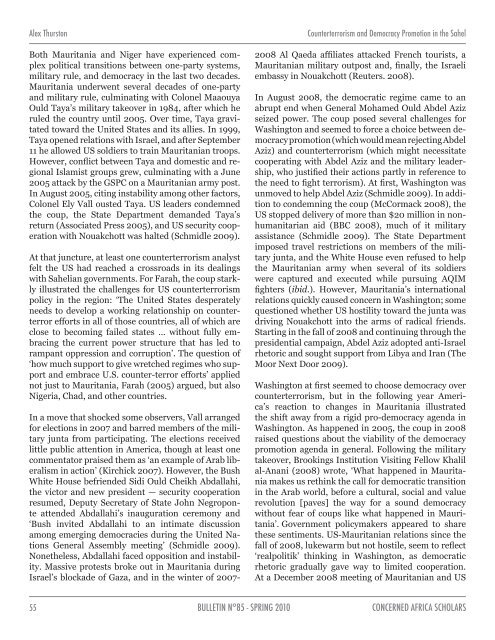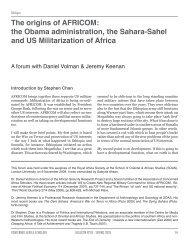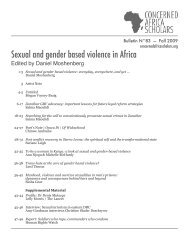Western Sahara and the United States' geographical imaginings
Western Sahara and the United States' geographical imaginings
Western Sahara and the United States' geographical imaginings
Create successful ePaper yourself
Turn your PDF publications into a flip-book with our unique Google optimized e-Paper software.
Alex Thurston Counterterrorism <strong>and</strong> Democracy Promotion in <strong>the</strong> Sahel<br />
Both Mauritania <strong>and</strong> Niger have experienced complex<br />
political transitions between one-party systems,<br />
military rule, <strong>and</strong> democracy in <strong>the</strong> last two decades.<br />
Mauritania underwent several decades of one-party<br />
<strong>and</strong> military rule, culminating with Colonel Maaouya<br />
Ould Taya’s military takeover in 1984, after which he<br />
ruled <strong>the</strong> country until 2005. Over time, Taya gravitated<br />
toward <strong>the</strong> <strong>United</strong> States <strong>and</strong> its allies. In 1999,<br />
Taya opened relations with Israel, <strong>and</strong> after September<br />
11 he allowed US soldiers to train Mauritanian troops.<br />
However, conflict between Taya <strong>and</strong> domestic <strong>and</strong> regional<br />
Islamist groups grew, culminating with a June<br />
2005 attack by <strong>the</strong> GSPC on a Mauritanian army post.<br />
In August 2005, citing instability among o<strong>the</strong>r factors,<br />
Colonel Ely Vall ousted Taya. US leaders condemned<br />
<strong>the</strong> coup, <strong>the</strong> State Department dem<strong>and</strong>ed Taya’s<br />
return (Associated Press 2005), <strong>and</strong> US security cooperation<br />
with Nouakchott was halted (Schmidle 2009).<br />
At that juncture, at least one counterterrorism analyst<br />
felt <strong>the</strong> US had reached a crossroads in its dealings<br />
with Sahelian governments. For Farah, <strong>the</strong> coup starkly<br />
illustrated <strong>the</strong> challenges for US counterterrorism<br />
policy in <strong>the</strong> region: ‘The <strong>United</strong> States desperately<br />
needs to develop a working relationship on counterterror<br />
efforts in all of those countries, all of which are<br />
close to becoming failed states … without fully embracing<br />
<strong>the</strong> current power structure that has led to<br />
rampant oppression <strong>and</strong> corruption’. The question of<br />
‘how much support to give wretched regimes who support<br />
<strong>and</strong> embrace U.S. counter-terror efforts’ applied<br />
not just to Mauritania, Farah (2005) argued, but also<br />
Nigeria, Chad, <strong>and</strong> o<strong>the</strong>r countries.<br />
In a move that shocked some observers, Vall arranged<br />
for elections in 2007 <strong>and</strong> barred members of <strong>the</strong> military<br />
junta from participating. The elections received<br />
little public attention in America, though at least one<br />
commentator praised <strong>the</strong>m as ‘an example of Arab liberalism<br />
in action’ (Kirchick 2007). However, <strong>the</strong> Bush<br />
White House befriended Sidi Ould Cheikh Abdallahi,<br />
<strong>the</strong> victor <strong>and</strong> new president — security cooperation<br />
resumed, Deputy Secretary of State John Negroponte<br />
attended Abdallahi’s inauguration ceremony <strong>and</strong><br />
‘Bush invited Abdallahi to an intimate discussion<br />
among emerging democracies during <strong>the</strong> <strong>United</strong> Nations<br />
General Assembly meeting’ (Schmidle 2009).<br />
None<strong>the</strong>less, Abdallahi faced opposition <strong>and</strong> instability.<br />
Massive protests broke out in Mauritania during<br />
Israel’s blockade of Gaza, <strong>and</strong> in <strong>the</strong> winter of 2007-<br />
55<br />
BULLETIN N°85 - SPRING 2010<br />
2008 Al Qaeda affiliates attacked French tourists, a<br />
Mauritanian military outpost <strong>and</strong>, finally, <strong>the</strong> Israeli<br />
embassy in Nouakchott (Reuters. 2008).<br />
In August 2008, <strong>the</strong> democratic regime came to an<br />
abrupt end when General Mohamed Ould Abdel Aziz<br />
seized power. The coup posed several challenges for<br />
Washington <strong>and</strong> seemed to force a choice between democracy<br />
promotion (which would mean rejecting Abdel<br />
Aziz) <strong>and</strong> counterterrorism (which might necessitate<br />
cooperating with Abdel Aziz <strong>and</strong> <strong>the</strong> military leadership,<br />
who justified <strong>the</strong>ir actions partly in reference to<br />
<strong>the</strong> need to fight terrorism). At first, Washington was<br />
unmoved to help Abdel Aziz (Schmidle 2009). In addition<br />
to condemning <strong>the</strong> coup (McCormack 2008), <strong>the</strong><br />
US stopped delivery of more than $20 million in nonhumanitarian<br />
aid (BBC 2008), much of it military<br />
assistance (Schmidle 2009). The State Department<br />
imposed travel restrictions on members of <strong>the</strong> military<br />
junta, <strong>and</strong> <strong>the</strong> White House even refused to help<br />
<strong>the</strong> Mauritanian army when several of its soldiers<br />
were captured <strong>and</strong> executed while pursuing AQIM<br />
fighters (ibid.). However, Mauritania’s international<br />
relations quickly caused concern in Washington; some<br />
questioned whe<strong>the</strong>r US hostility toward <strong>the</strong> junta was<br />
driving Nouakchott into <strong>the</strong> arms of radical friends.<br />
Starting in <strong>the</strong> fall of 2008 <strong>and</strong> continuing through <strong>the</strong><br />
presidential campaign, Abdel Aziz adopted anti-Israel<br />
rhetoric <strong>and</strong> sought support from Libya <strong>and</strong> Iran (The<br />
Moor Next Door 2009).<br />
Washington at first seemed to choose democracy over<br />
counterterrorism, but in <strong>the</strong> following year America’s<br />
reaction to changes in Mauritania illustrated<br />
<strong>the</strong> shift away from a rigid pro-democracy agenda in<br />
Washington. As happened in 2005, <strong>the</strong> coup in 2008<br />
raised questions about <strong>the</strong> viability of <strong>the</strong> democracy<br />
promotion agenda in general. Following <strong>the</strong> military<br />
takeover, Brookings Institution Visiting Fellow Khalil<br />
al-Anani (2008) wrote, ‘What happened in Mauritania<br />
makes us rethink <strong>the</strong> call for democratic transition<br />
in <strong>the</strong> Arab world, before a cultural, social <strong>and</strong> value<br />
revolution [paves] <strong>the</strong> way for a sound democracy<br />
without fear of coups like what happened in Mauritania’.<br />
Government policymakers appeared to share<br />
<strong>the</strong>se sentiments. US-Mauritanian relations since <strong>the</strong><br />
fall of 2008, lukewarm but not hostile, seem to reflect<br />
‘realpolitik’ thinking in Washington, as democratic<br />
rhetoric gradually gave way to limited cooperation.<br />
At a December 2008 meeting of Mauritanian <strong>and</strong> US<br />
CONCERNED AFRICA SCHOLARS




